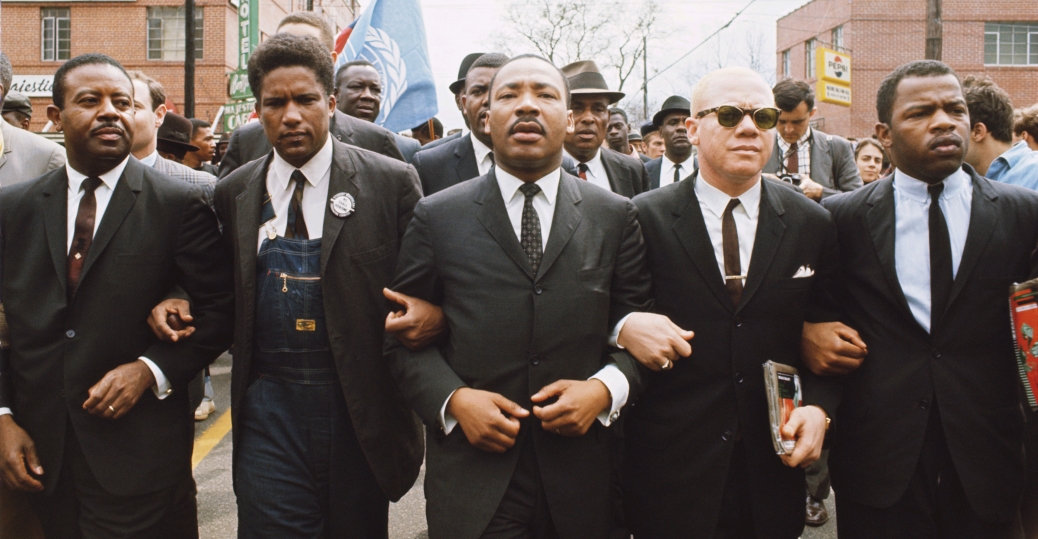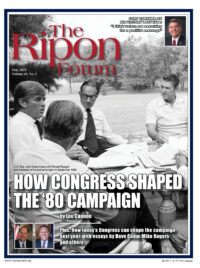
(Editor’s note: this is the second in a series of essays being published this year to commemorate the 50th anniversary of The Ripon Forum.)
“We were tired of apologizing to people on our campuses for being Republicans, and tired of apologizing to some Republicans for being on a college campus.”
This was the comment that some of the founders of the Ripon Society liked to make when asked what prompted the launching of the organization. The remark is best understood in the context (historically) of 1962 and (geographically) of Cambridge, Massachusetts. It was the height of the Kennedy era, and the great buzz word of the day was that the Kennedy Administration was uniquely tapping into the world of exciting new ideas. The cloud hanging over the Republican Party was the recollection of the recent McCarthy era – which had widened a growing gulf between the country’s centers of learning and the GOP.
This was not to say that Republicans could not cite their own strong intellectual roots; well into the twentieth century, in fact, the party of Lincoln had as much or more support among the so-called “educated classes” as did the Democrats – and that affinity had been strengthened during the Progressive Era. But the traumas of the Great Depression and two World Wars, along with the appeal of the New Deal and the excesses of both witch-hunting extremism and isolationist nationalism had changed older patterns of party identification.
Those who first came together to launch the Ripon organization in 1962 were mostly students, recent students, or young faculty members – in the Boston area at first, and then across the country. We drew on the model of Great Britain’s Bow Group, a moderate, policy-oriented affiliate of the UK’s Conservative party. Our central proposition initially was that the country deserved two major political parties with lively academic resources – and proud ties to centers of learning. And we shared a deep aversion to the common stereotype among young people at the time that the Republicans were “the stupid party.”
There was one set of policy concerns that came to define and motivate the Ripon Society more than any other – and that was a renewed commitment to the advancement of Civil Rights.
It didn’t have to be this way, the group believed, and we set out to prove it by developing over the next several years a series of policy proposals addressing great public challenges, but in ways that emphasized traditional Republican themes – including marketplace incentives, private initiatives, decentralized power, streamlined government and broadly-based international engagement. Over time, most of Ripon’s early agenda (revenue sharing, welfare reform, a volunteer army, minority business enterprise, school desegregation, government reorganization, affirmative action, a new opening to China and other initiatives) was reflected in the policies of the Nixon administration.
But there was one set of policy concerns that came to define and motivate the Ripon Society more than any other – and that was a renewed commitment to the advancement of Civil Rights.
Among the members’ strong convictions was that Civil Rights was a matter on which the party of Lincoln should exercise particularly strong leadership. It was a part of the party’s DNA at the time, we thought, stretching back to its earliest days. It was an issue on which Democratic administrations through the years had been compromised by their strong dependence on southern Congressional and Electoral College support. Civil Rights was a cause that had been advanced in the 1950’s by Republican leadership on the Supreme Court of the United States – and enforced most recently by a Republican president. (And it would, in fact, soon be advanced much further, through 1960’s federal legislation which would draw more support from Republicans than from Democrats in the United States Congress.)
Ironically, however, Civil Rights also became the one issue which most clearly separated the Ripon Society from the nascent New Conservative movement as it emerged in the 1960’s and 1970’s.
Among the members’ strong convictions was that Civil Rights was a matter on which the party of Lincoln should exercise particularly strong leadership.
Nonetheless, it was support for Civil Rights which most forcefully galvanized the Ripon founders. Perhaps the first reflection of that fact came when the group adopted the name of the Wisconsin town where the party had first been organized, with strong abolitionist support, in 1854. The Ripon Society held one of its first public press conferences there, on the grounds of the “Little White School House” where the Party’s leaders first called themselves “Republicans.” (The School House still adorns the nameplate of The Ripon Forum.) And the Society adopted as its logo – marking its stationery and a growing flow of press releases, reports and other documents – a silhouette of Abraham Lincoln.
The Republican Party has experienced a vast array of ups and downs since that time—but the Lincoln legacy still represents an ideal Party lodestar. This anniversary occasion is surely an appropriate time for remembering and advancing that legacy.

Lee Huebner was the Ripon Society’s second president from 1967 to 1969. He later was a speechwriter in the Nixon White House and now is a professor at the George Washington University.




